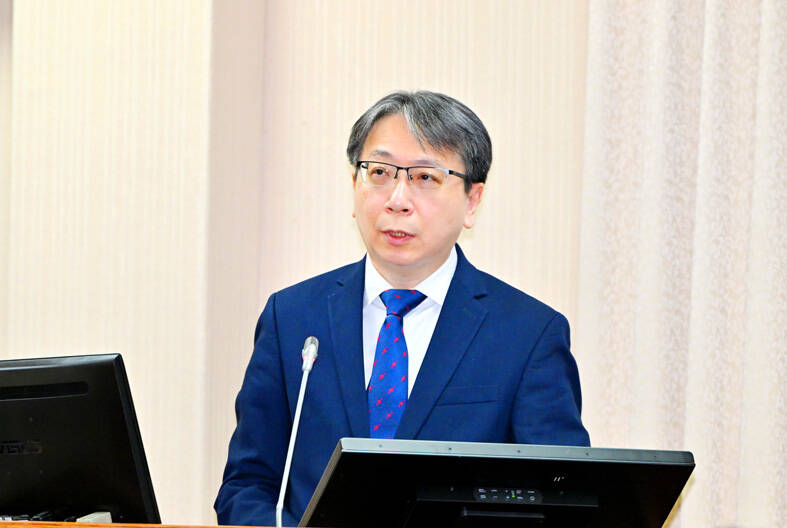The Ministry of Justice Investigation Bureau has established a third-party review committee to investigate the possible infiltration of Taiwanese organizations by the Chinese Communist Party (CCP), sources said last week.
The bureau first proposed the formation of the committee two years ago, saying that the CCP was diversifying its tactics to infiltrate Taiwan, making it harder to identify the source of such efforts and to make arrests, sources said.
“The CCP is increasingly using Taiwan’s democracy and freedoms to its advantage in infiltrating Taiwan’s organizations,” bureau Director-General Chen Pai-li (陳白立) said on July 4 while speaking to lawmakers at the Legislative Yuan.

Photo: Tien Yu-hua, Taipei Times
Citing examples of the CCP’s methods, Chen said it uses Taiwanese to help it recruit people and to spy in Taiwan; engages in actions that influence the outcome of Taiwan’s elections and cognitive warfare to undermine the credibility of the ruling Democratic Progressive Party; initiates cyberattacks on sensitive systems in Taiwan; poaches talent and steals industry secrets from Taiwanese companies; manipulates Taiwanese under the guise of engaging in cultural exchanges; and provides benefits and concessions to Taiwanese who act on its behalf.
However, when cases go to trial in Taiwan, they often result in acquittals, a source said on Sunday last week.
The bureau has been reviewing the cases and trying to determine whether the acquittals are due to judges’ misunderstanding of the cases or a lack of evidence for prosecution, the source said.
“It’s usually hard to prove that the CCP is behind spying activity. The defendant would normally deny the connection, and of course we cannot ask China for evidence,” they said.
Tying the cash flow in such cases to China is also difficult, as the CCP seeks conceal its involvement by moving money through underground exchanges, virtual currencies and other methods that are difficult to trace, they said.
The bureau has sought to solve the issue by establishing a third-party case review committee with the National Security Bureau, the Mainland Affairs Council and the Military Intelligence Bureau, among other agencies, they said.
Senior prosecutors believe that the Anti-Infiltration Act (反滲透法) does not need to be revised to pursue spying cases, but rather that prosecutors need clearer targets, such as those set during election periods, which prohibit certain exchanges with China, the source said.
“If the Ministry of Justice, the Central Election Commission and other government agencies set clear targets like that, then we know what to go after,” they said.
To facilitate Taiwanese exchanges with people in China that do not contravene the law, authorities should set clear timelines for such exchanges ahead of elections and should encourage Taiwanese to reject invitations from China that would conflict with regulations, Taipei prosecutor Lin Ta (林達) said.
Different timelines for exchanges should also be set according to the scale of the election, he said.
For example, restrictions are in place 10 months prior to presidential elections, he added.
“I believe that as long as the laws are clear, people will be less likely to contravene them,” he said.

An essay competition jointly organized by a local writing society and a publisher affiliated with the Chinese Communist Party (CCP) might have contravened the Act Governing Relations Between the People of the Taiwan Area and the Mainland Area (臺灣地區與大陸地區人民關係條例), the Mainland Affairs Council (MAC) said on Thursday. “In this case, the partner organization is clearly an agency under the CCP’s Fujian Provincial Committee,” MAC Deputy Minister and spokesperson Liang Wen-chieh (梁文傑) said at a news briefing in Taipei. “It also involves bringing Taiwanese students to China with all-expenses-paid arrangements to attend award ceremonies and camps,” Liang said. Those two “characteristics” are typically sufficient

A magnitude 5.9 earthquake that struck about 33km off the coast of Hualien City was the "main shock" in a series of quakes in the area, with aftershocks expected over the next three days, the Central Weather Administration (CWA) said yesterday. Prior to the magnitude 5.9 quake shaking most of Taiwan at 6:53pm yesterday, six other earthquakes stronger than a magnitude of 4, starting with a magnitude 5.5 quake at 6:09pm, occurred in the area. CWA Seismological Center Director Wu Chien-fu (吳健富) confirmed that the quakes were all part of the same series and that the magnitude 5.5 temblor was

The brilliant blue waters, thick foliage and bucolic atmosphere on this seemingly idyllic archipelago deep in the Pacific Ocean belie the key role it now plays in a titanic geopolitical struggle. Palau is again on the front line as China, and the US and its allies prepare their forces in an intensifying contest for control over the Asia-Pacific region. The democratic nation of just 17,000 people hosts US-controlled airstrips and soon-to-be-completed radar installations that the US military describes as “critical” to monitoring vast swathes of water and airspace. It is also a key piece of the second island chain, a string of

The Central Weather Administration has issued a heat alert for southeastern Taiwan, warning of temperatures as high as 36°C today, while alerting some coastal areas of strong winds later in the day. Kaohsiung’s Neimen District (內門) and Pingtung County’s Neipu Township (內埔) are under an orange heat alert, which warns of temperatures as high as 36°C for three consecutive days, the CWA said, citing southwest winds. The heat would also extend to Tainan’s Nansi (楠西) and Yujing (玉井) districts, as well as Pingtung’s Gaoshu (高樹), Yanpu (鹽埔) and Majia (瑪家) townships, it said, forecasting highs of up to 36°C in those areas